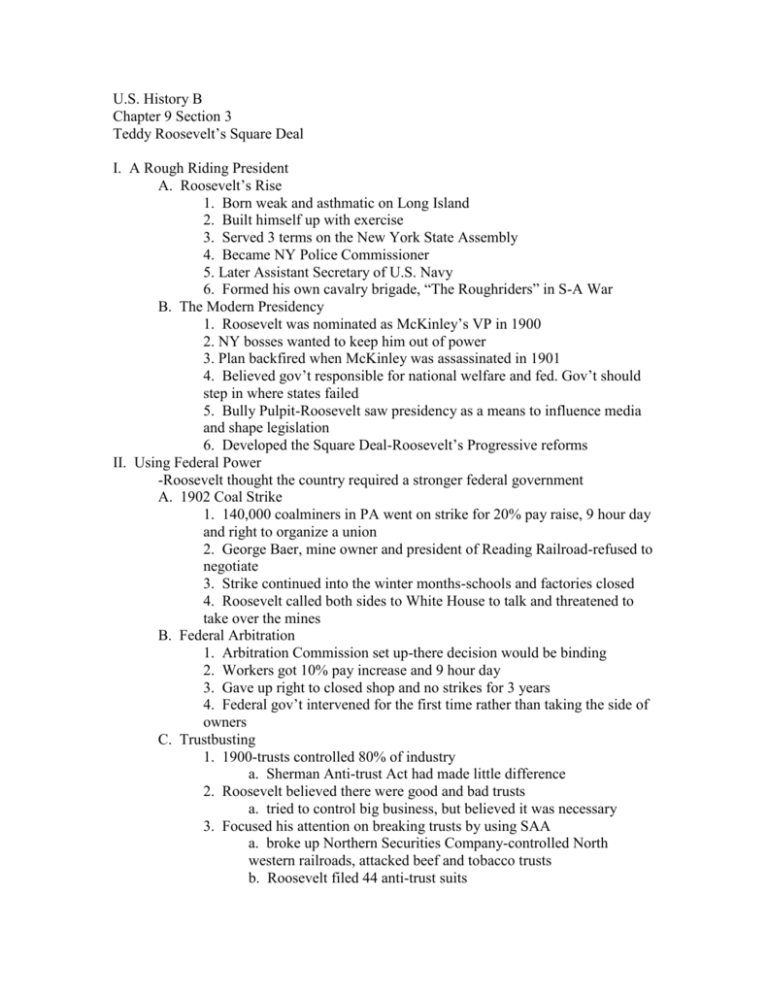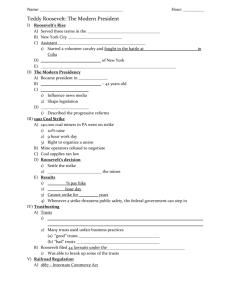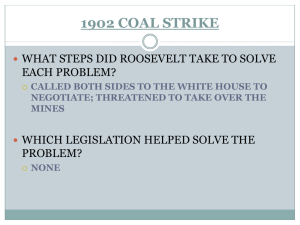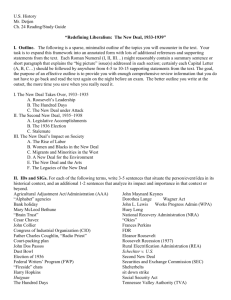9-3 Notes - Maloney High School
advertisement

U.S. History B Chapter 9 Section 3 Teddy Roosevelt’s Square Deal I. A Rough Riding President A. Roosevelt’s Rise 1. Born weak and asthmatic on Long Island 2. Built himself up with exercise 3. Served 3 terms on the New York State Assembly 4. Became NY Police Commissioner 5. Later Assistant Secretary of U.S. Navy 6. Formed his own cavalry brigade, “The Roughriders” in S-A War B. The Modern Presidency 1. Roosevelt was nominated as McKinley’s VP in 1900 2. NY bosses wanted to keep him out of power 3. Plan backfired when McKinley was assassinated in 1901 4. Believed gov’t responsible for national welfare and fed. Gov’t should step in where states failed 5. Bully Pulpit-Roosevelt saw presidency as a means to influence media and shape legislation 6. Developed the Square Deal-Roosevelt’s Progressive reforms II. Using Federal Power -Roosevelt thought the country required a stronger federal government A. 1902 Coal Strike 1. 140,000 coalminers in PA went on strike for 20% pay raise, 9 hour day and right to organize a union 2. George Baer, mine owner and president of Reading Railroad-refused to negotiate 3. Strike continued into the winter months-schools and factories closed 4. Roosevelt called both sides to White House to talk and threatened to take over the mines B. Federal Arbitration 1. Arbitration Commission set up-there decision would be binding 2. Workers got 10% pay increase and 9 hour day 3. Gave up right to closed shop and no strikes for 3 years 4. Federal gov’t intervened for the first time rather than taking the side of owners C. Trustbusting 1. 1900-trusts controlled 80% of industry a. Sherman Anti-trust Act had made little difference 2. Roosevelt believed there were good and bad trusts a. tried to control big business, but believed it was necessary 3. Focused his attention on breaking trusts by using SAA a. broke up Northern Securities Company-controlled North western railroads, attacked beef and tobacco trusts b. Roosevelt filed 44 anti-trust suits c. not really looking to bust trusts, but to regulate business D. Railroad Regulation 1. Interstate Commerce Act- 1887 prohibited pools-owners divided business in given areas and split profits 2. Interstate Commerce Commission-little power before Roosevelt a. Elkins Act of 1903-made rebates illegal, railroad rates must be public b. Hepburn Act of 1906-limited distribution of free RR passes, set maximum railroad rates-subject to court approval III. Protecting Citizens and the Environment A. Protecting Health 1. Influenced by The Jungle by Upton Sinclair a. appointed a commission to investigate meatpacking industry 2. Meat Inspection Act-1906 a. dictated strict cleanliness for meatpackers and a program of inspection that lasted until the 1990s b. gov’t had to pay for inspections, canned goods need not be dated B. Pure Food and Drug Act-1906 1. stopped sale of contaminated foods, beverages and drugs 2. called for truth in labeling 3. stopped the use of coal tar dye and borax in sausage and formaldehyde in pork and beans 4. Drug manufacturers had to tell consumers what was in the products C. Conservation and Natural Resources 1. Natural resources being used up at an alarming rate 2. John Muir-naturalist and writer a. persuaded TR to set aside 148 million acres of forest 3. TR also set aside 1.5 million acres of water-power sites and 80 million acres to be explored by the U.S. Geographical Survey for mineral and water resources D. Gifford Pinchot-professional conservationist 1. Named as head of U.S. Forest Service in 1905 a. advised TR to conserve large tracts of federal land 2. Differed from Muir-some wilderness to be used for public good 3. National Reclamation Act of 1902-Newlands Act-money from sale of lands in the west paid for irrigation projects like the Roosevelt Dam in AZ and Shoshone Dam in Wyoming IV. Roosevelt and Civil Rights A. Progressive Attitude toward Civil Rights 1. Not a major concern 2. supported individual African-Americans, but not as a whole 3. TR invited Booker T. Washington to White House-head of Tuskegee Institute-accommodated segregation 4. Washington criticized by W.E.B. DuBois B. NAACP-National Association for the Advancement of Colored People 1. aimed for full equality among races 2. progressive movement focused on middle class whites






